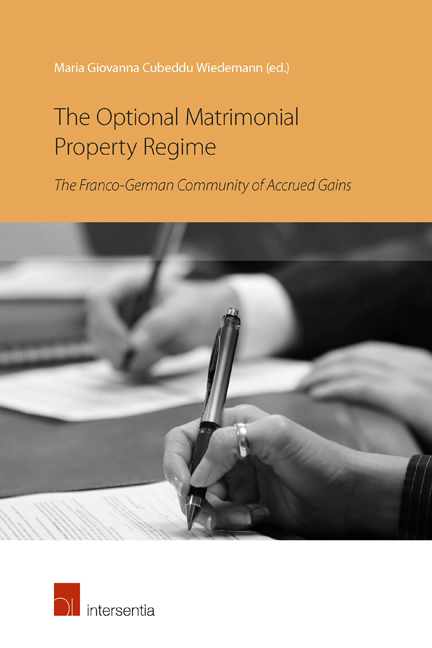The Optional Matrimonial Property Regime
from PART I - INTRODUCTION
Published online by Cambridge University Press: 28 November 2017
Summary
EUROPEAN LEGISLATION, DOMESTIC LAWS AND JOINT RULES
Within the European Union (EU), family law is governed in a variety of ways. The search for European solutions to provide an adequate response to the gradual increase of marriages between people of different nationalities and people not living in their state of origin has been going on for some time. A harmonization of the substantive family law of the individual states in its entirety cannot be attempted due to the distinct traditions and cultures of those states. Consider the difficulties faced by the EU in their effort to harmonize the rules of jurisdiction and applicable law in matters of divorce and separation, or of jurisdiction, applicable law and the recognition and enforcement of decisions in matters of matrimonial property regimes. These projects, part of a broader plan of European codification, stalled not only because of divergent rules on conflicts of law, or because of the difficult issues regarding various criteria of the applicable law such as domicile or citizenship, but above all because of the foreseeable multiplicity of models of marriage or divorce.
The harmonization process in family law, however, is now undoubtedly underway. The concern lies with finding appropriate instruments and methods. One common approach is drawn from the Franco-German Agreement on the optional matrimonial property regime of the community of accrued gains, which has recently become law in both countries. This project - assumed on the occasion of the 40th anniversary of the Elysée-Vertrag between Germany and France - which relates to the regulation of an optional property regime common to both jurisdictions, aims to address the difficulty of establishing the applicable law in transnational relationships and the obstacles that the community of property regime creates in the credit sector, as well as the desire for a more prompt resolution of disputes. At the proposal of German Minister for Justice Leutheusser-Schnarrenberger, on 13 January 2010, the German Government consented to the Agreement. “Cosmopolitanism does not reveal itself only in ideas, but also and especially in life projects” (“Weltoffenheit zeigt sich nicht nur in Einstellungen sondern auch und gerade in Lebensentwürfen”).
- Type
- Chapter
- Information
- The Optional Matrimonial Property RegimeThe Franco-German Community of Accrued Gains, pp. 3 - 16Publisher: IntersentiaPrint publication year: 2014

